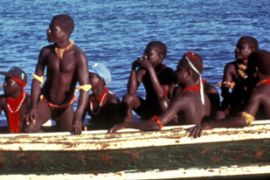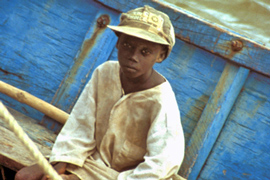UN steps in to save Andaman tribe
Committee demands closure of road that threatens existence of the Jarawa.

The committee’s report recommended that the Indian authorities “implement the 2002 order of the Indian Supreme Court to close the sections of the Andaman Trunk Road that run through the Jarawa reserve”.
Endangered
The Jarawa tribe, a nomadic hunter-gathering people, has inhabited the Andaman and Nicobar islands for almost 60,000 years.
| The Jawara tribe |
|
“Some of the other tribes have been decimated because of forced relocations. For the authorities not learn from the lessons of history would be disasterous” Miriam Ross, |
They live on the Western coast of the Middle Andaman and South Andaman Islands. Virtually no outsiders speak their language and they live in groups of 40 to 50 people.
Miriam Ross of Survival International (SI), an organisation that supports tribal groups worldwide, said: “Because the Jarawa have maintained their land and their independence for so long, they have managed to stay healthy and kept their number.”
SI, a group that lobbied the UN on the problem, said the failure of the Indian government to safeguard the future of the Jarawa people of the Andaman Islands, could lead to them being completely wiped out.
The Indian government established a reserve for the Jarawa in 1957 and it remains illegal for people other than the Jarawa to enter this area without special permission.
Despite this order, the government completed the 340km Andaman motorway in 1998, directly through a large section of the reserve, which brought the Jarawa into daily contact with outsiders.
Highway intrusion
Before the road’s physical intrusion, the Jarawas had resisted contact with outsiders until 1998, often shooting trespassers in their forest with bows and arrows.
“Following poachers encroaching on their land, taking their resources, and the ATR’s intrusion, it is likely that they thought they would not be able to protect themselves in isolation and so were forced to make contact with the outside world,” Ross said.
RK Bhattacharya, who retired as head of the Anthropological Survey of India in 2003, said: “The ATR is considered an access to evil” and recommended that the Andaman authorities follow the Supreme Court decision and close it.
 |
| The ATR has exposed the Jarawa to exploitation, violence and disease [Survival] |
The Indian government has since remained relatively silent over the issue and the island administration even filed a review petition to rebuff the 2002 Supreme Court decision.
GC Joshi, secretary in charge of tribal affairs in the Andaman and Nicobar administration, said: “You have to look at the other side too. The alternative way through the sea is not a 365-day route.
“There are many more cars here today than 20 years back.”
Samir Acharya, founder of the Society for Andaman and Nicobar Ecology (SANE), who has been an island inhabitant since 1967, said: “The administration here is made up of officers from landlocked states on the mainland who think thrice before taking a boat. But it is not a problem for locals.”
Forceful resettling
The situation has been complicated by an Andaman court case aiming at having the Jarawa forcefully resettled.
|
“You have to look at the other side too. The alternative way through the sea is not a 365-day route” GC Joshi, Andaman officer for tribal affairs |
In 1990, the Andaman and Nicobar islands administration announced that it planned forcibly to settle the Jarawa in local villages.
SI has said that forcibly resettling the Jarawa is “tantamount to genocide”. Ross said: “Had this decision gone through, it may have wiped them out completely.
“Some of the other tribes have been decimated because of forced relocations. For the authorities not learn from the lessons of history would be disastrous.”
When asked if the UN report would have any influence on the Indian government, Ross said it was important to keep pressure on the Indian government to uphold the supreme court decision.
“It’s a case of increasing pressure and making it clear to the Indian government that the international attention on this issue is not going to go away.”
The CERD report comes on the UN day for the elimination of racial discrimination, which includes celebrating the end to use of terms such as “primitive” and “stone age” to describe tribal and indigenous peoples in the media.
The term “primitive” remains part of official Indian government vocabulary relating to tribal peoples, including the Jarawa and 74 tribes across the country.
Al Jazeera is not responsible for the content of external websites.